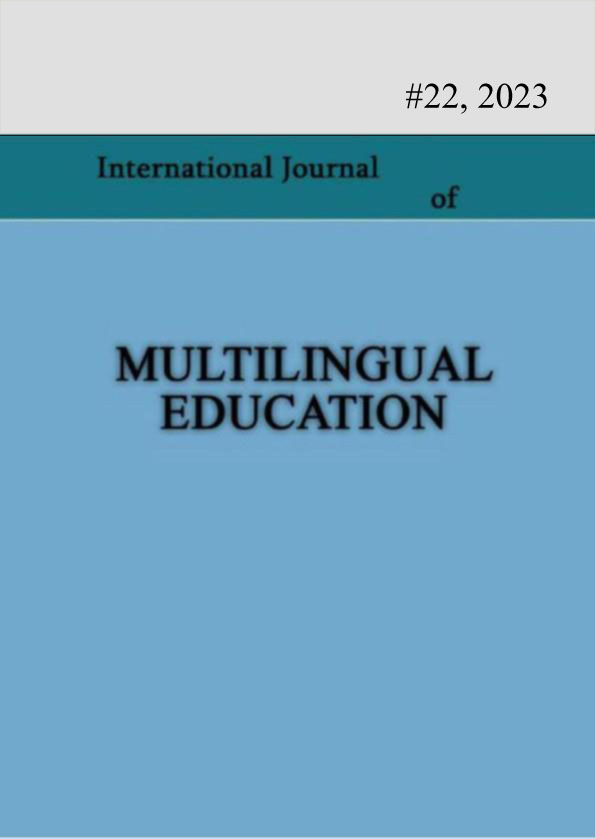The Russification Language Policy in Georgia (Based on the Georgian Émigré Newspaper “Sakartvelo”)
Keywords:
Language policy, Russification, Georgian language, Immersion method.Abstract
Russification is a special case of cultural assimilation, when small nations fall under the influence of the Russian language and culture (Weinreich, 1953; Thaden, 1981; Weinerman, 1996; Kappeler, 2004; Jones, 2005; Miller, 2008; Weeks, 2010). At the beginning of the 20th century, the norms of the language policy developed in the Russian Empire applied to the conquered and imperial countries, including Georgia.
The present paper aims to study the problems of the Russification language policy on the example of Georgia. The digital corpus of “Sakartvelo” (Georgia), the newspaper of the Georgian Emigrants of the early 20th century, is used to provide empirical data. Illustrative data have been collected and the questions given below are discussed using the method of sociolinguistic: 1) To what extent was the local population of Georgia ready to accept the Russian language in schools and theological education? 2) To what extent was the “immersion method” of teaching justified in the Russification language policy of the early 20th century in Georgia? 3) Under the Russification language policy in Georgia, in what directions was the protection of the Georgian language provided?
Such an approach to the problem will show us what measures were taken by the founders of the Georgian émigré press in terms of exposing the educational policy of Russification, forming a healthy public opinion and protecting the Georgian language, more specifically, how the Georgian newspaper "Sakartvelo”, published in Paris in 1903-1905, responded to this problem.
References
Berlitz, M. (1916). The Berlitz Method for Teaching Modern Languages. English part (Revised American edition). New York: Berlitz. (Original work published in 1888).
Djanelidze, O. (2008). The Essence of Russian Colonialism, in: Russian Colonization in Georgia, Tbilisi, pp. 486-535.
Gagua, V. (1974). Public Education in Georgia after the 19th-century Reform. Tbilisi [in Georgian] Gouin, F. (1892). The Art of Teaching and Studying Language, London: Longmans, Green & Co.
Jones, S. F. (2005). Socialism in Georgian Colors: The European Road to Social Democracy, 1883- 1917, Harvard University Press.
Jordania, T. (1913). The Struggle for the Georgian Language in 1882-1910. Kutaisi [in Georgian] Kappeler, A. (2004). The Ambiguities of Russification, in: Kritika: Explorations in Russian and Eurasian History. 5, 291-297.
Khundadze, T. (1951). Essays from the History of Public Education in Georgia (XIX century). Tbilisi [in Georgian]
Khundadze, T. (1939). Educational Policy of Tsarism in Georgia. Tbilisi [in Georgian]
Laitin, D. (1998). Identity in Formation: The Russian-speaking Populations in the Near Abroad.Ithaca, NY: Cornell University Press.
Miller, A. (2008). The Romanov Empire and Nationalism: Essays in the Methodology of Historical Research. New York: Central European University Press.
Riasanovsky, N. V. (2005). Russian Identities: A Historical Survey. Oxford University Press. Richards, J. & Rodgers, T. (2001). Approaches and Methods in Language Teaching. Cambridge University Press.
Sauveur, Lambert (1874b). Introduction to the Teaching of Living Languages without Grammar or Dictionary. Boston, New York: F. W. Christern.
Sharadze, G. (2001). The History of the Georgian Emigrant Journalism, Vol. I. Tbilisi [in Georgian] Shohamy, E. (2006). Language Policy: Hidden Agendas and New Approaches. London: Routledge. Spolsky, B. (2004). Language Policy. Cambridge University Press.
Shvelidze, D. (1993). Formation of Political Parties in Georgia - Federalists. Tbilisi [in Georgian]
Sigua, S. (1959). Essays on the History of the Development of Public Education and Pedagogical Ideas in Georgia. Tbilisi [in Georgian]
Tannenbaum, M.; Shohamy, E. (2023). Developing Multilingual Education Policies: Theory, Research, Practice, Routledge.
Thaden, E. C. (1981). Russification in the Baltic Provinces and Finland, 1855–1914. Princeton, N. J. Weeks, T. R. (2010). Across the Revolutionary Divide: Russia and the USSR, 1861-1945. Wiley-Blackwell.
Weinerman, E. (1996). Russification in Imperial Russia: The Search for Homogeneity in the Multinational State. Indiana University.
Weinreich, U. (1953). The Russification of Soviet Minority Languages. Problems of Communism, XI (6), 46-57.
Sources
Ganatleba. (1913). Journal “Ganatleba”, 2. Retrieved from https://dspace.nplg.gov.ge/handle/1234/389634
La Géorgie. (1903). Newspaper “La Géorgie”, 1; 4. Retrieved from https://dspace.nplg.gov.ge/handle/1234/32211/simple-
search?filterquery=1903&filtername=dateIssued&filtertype=equals Sakartvelo. (1903). Newspaper “Sakartvelo”, 2; 3; 4; 5; 6; 7. Retrieved from https://dspace.nplg.gov.ge/handle/1234/95/simple-
search?filterquery=1903&filtername=dateIssued&filtertype=equals Sakartvelo. (1904). Newspaper “Sakartvelo”, 1; 9. Retrieved from https://dspace.nplg.gov.ge/handle/1234/95/simple-
search?filterquery=1904&filtername=dateIssued&filtertype=equals Sakartvelo. (1905). Newspaper “Sakartvelo”, 20. Retrieved from https://dspace.nplg.gov.ge/handle/1234/95/simple-
search?filterquery=1905&filtername=dateIssued&filtertype=equals
Tsnobis Purtseli. (1904). Newspaper “Tsnobis Purtseli”, 2597; 2652. Retrieved from https://dspace.nplg.gov.ge/handle/1234/16074/simple-
search?filterquery=1904&filtername=dateIssued&filtertype=equals
Downloads
Published
How to Cite
Issue
Section
License

This work is licensed under a Creative Commons Attribution-NonCommercial 4.0 International License.
Copyright (c) - Authors who publish with this journal agree to the following terms: Authors retain copyright and grant the journal the right of first publication with the work simultaneously licensed under a Creative Commons Attribution-Noncommercial 4.0 International License, which allows others to share the work with an acknowledgement of the work's authorship and initial publication in this journal. Authors are permitted and encouraged to post their work online (e.g., in institutional repositories or on their personal website) prior to and during the submission process, as it can lead to productive exchanges, as well as earlier and greater citation of published work (see The Effect of Open Access). Authors may enter into separate, additional contractual arrangements for the non-exclusive distribution of the journal's published version of the work (e.g., post it to a repository or publish it in a book), with an acknowledgement of its initial publication in this journal.

